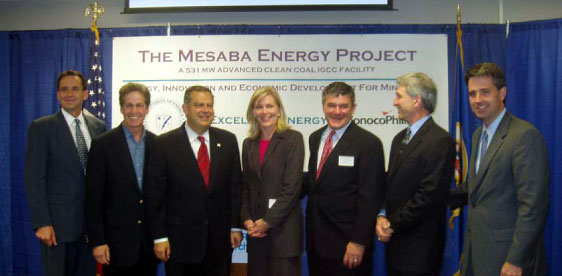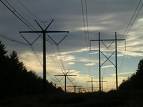ALJ RECOMMENDS DENIAL OF MESABA PPA
April 12th, 2007
.
Read all about it:
ALJ RECOMMENDATION – DENIAL OF PPA

From the decision:
CONCLUSIONS OF LAW
1. The Minnesota Public Utilities Commission and the Administrative Law Judges have jurisdiction over this matter pursuant to Minn. Stat. §§ 216B.08, 216B.1693, 216B.1694, and 14.50, Minn. R. 1400.5100-.8400, and to the extent not superseded by those rules, Minn. R. 7829.0100-.3200.
2. The Commission gave proper notice of the hearing in this matter, has fulfilled all relevant substantive and procedural requirements of law or rule, and has the authority to take the action proposed.
3. The IEP Statute permits the Commission to amend or modify the initial PPA to raise or lower the amount of the Project’s statutory power sale entitlement.
4. The Project does not satisfy the first prong of the definition of an Innovative Energy Project under Minn. Stat. § 216B.1694, subd. 1(1), because the Final PPA does not assure that coal will be used as the primary fuel and because it has not been established that the Project significantly reduces all of the statutorily identified emissions in comparison to traditional technologies.
5. The Project satisfies the second prong of definition of an Innovative Energy Project under Minn. Stat. § 216B.1694, subd. 1(2), because it is capable of offering a long-term supply contract at a hedged, predictable cost.
6. Since the Project fails to meet the requirements of Minn. Stat. § 216B.1694, subd. 1(1), it is not an “Innovative Energy Project†for purposes of Minn. Stat. § 216B.1694.
7. Since the Project is not an Innovative Energy Project, it does not qualify under Minn. Stat. § 216B.1694, subd. 2(a)(4), as a “Clean Energy Technology” as defined in section 216B.1693.
8. The Final PPA is not in the public interest as required by Minn. Stat. § 216B.1694, subd. 2(a)(7).
9. The Final PPA should not be approved, primarily because of its unreasonable cost to Xcel Energy and its ratepayers, the likelihood that its cost will increase, not decrease over time, and because of the other deficiencies identified in the Findings. While Excelsior Energy and its witnesses have claimed that the PPA cost will become more reasonable in the future, particularly in light of the Project’s environmental benefits, there is not sufficient evidence of that value to overcome the very significant cost difference that exists today.
10. The Project and its technology do not meet the definition of a Clean Energy Technology under Minn. Stat. §216B.1693(c) because they do not significantly reduce all the statutorily identified emissions in comparison to traditional technologies.
11. The Project and its technology do not satisfy the requirements of Minn. Stat. § 216B.1693(a) because the Final PPA is not, and is not likely to be, a least cost resource including the costs of ancillary services and other necessary generation and transmission upgrades.
12. It would be contrary to the public interest for the Project to supply at least two percent of Xcel Energy’s retail load starting in 2012.
Based on the foregoing Conclusions, and for reasons set forth in the following Memorandum, the Administrative Law Judges make the following:
RECOMMENDATION
IT IS HEREBY RESPECTFULLY RECOMMENDED that the Public Utilities Commission order:
1. That Excelsior Energy’s Petition asking the Commission to approve, amend, or modify the terms and conditions of the Final PPA under Minn. Stat. § 216B.1694 be DENIED and that the Final PPA be DISAPPROVED.
2. That if the Commission approves the Final PPA, that it first be amended through negotiations among Excelsior Energy, Xcel Energy, and the Department to address the deficiencies identified in this Report, then returned to the Commission for final approval.
3. That Excelsior Energy’s Petition asking the Commission to determine under Minn. Stat. § 216B.1693 that the Project and its IGCC technology is, or is likely to be, a least-cost resource, thus obligating Xcel Energy to use the plant’s generation for at least two percent of the energy supplied to its retail customers, be DENIED.
4. That Excelsior Energy’s Petition asking the Commission to determine that, under the terms of Minn. Stat. § 216B.1693, at least 13 percent of the energy supplied to Xcel Energy’s retail customers should come from the Units I and II of the Mesaba Energy Project by 2013 be considered in Phase 2 of this matter.
Dated: April 12, 2007
/s/ Steve M. Mihalchick
STEVE M. MIHALCHICK
Administrative Law Judge/s/ Bruce H. Johnson
BRUCE H. JOHNSON
Administrative Law Judge
Mesaba coal gasification in the GRHR
February 26th, 2007
There’s another Letter to the Editor today in the Grand Rapids Herald Review — the writer doesn’t take into account the pollution and health hazards that the Mesaba Proect presents, nor does he address the extreme burden his proposal would place on Minnesota Power, already distressed about the rate impacts of the transmission cost!
Wednesday, February 21st, 2007 10:52:51 AM
Editor:
The Itasca County Board is supporting the construction of an approximately 600 MW coal gasification plant which so far is apparently publicly funded. Part of this public support is the construction of infrastructure and part is the agreement that the project will not pay taxes back to the county in the near future.
On the other hand, other large companies like Blandin and Minnesota Power do pay taxes that benefit Itasca County as well as providing good jobs.
By locating the Mesaba project on its Highway 7 proposed site, the county must construct a short line rail and accept long wait times at rail crossings, extend a gas pipeline, construct a transmission line, dedicate the waters of the Canisteo pit and convert a greenfield site. Why not locate the project in a more suitable location where most of this infrastructure already exists?
If the project were located at the current Boswell plant site, it would be in an industrial location where gas, rail and transmission corridors exist. With lower emissions (as stated by Excelsior), it could replace Units 1 and 2 to the benefit of the environment. Operating costs would be reduced as the cost of coal delivery would be lowered.
It appears that the main objection to the Mesaba project is the chosen site and the exposure of Itasca County taxpayers to risk from funding and operating infrastructure projects. Relocating the project to the Boswell site would address both of these concerns while still preserving the project and the jobs.
Dean Sedgwick
Reply Briefs in Excelsior Mesaba docket
January 21st, 2007

Yes, the Reply Briefs for Excelsior’s Meaba coal gasification project PPA at the PUC have flown around the ether, and here they are:
mncoalgasplant.com Reply Brief
STrib reports Mesaba in trouble
January 9th, 2007

There’s a piece on MPR too, but I”ve not heard it yet, I wasn’t glued to the radio at 6:20 a.m.!!!

Here’s the STrib article, thanks Mikey! This Garvey “letter” or “Policy Statement” or “Late Filed Testimony” is such a mess of mixed messages, a step, but it’s something that could mean something to everyone, quite the political statement… sigh…
This STrib report is just part of the story, note that Amit found the costs Garvey says should be included in the flat rate are way higher than that, $170-180/MWh, and nevermind that Amit’s estimate of the costs of transmission are WAY low (and the transmission request has been DENIED by MISO) .
MOST IMPORTANT: Garvey talks about COST of carbon capture and sequestration BUT there is no requirement that it be done! So we pay but don’t get any benefit — that’s called a TRADE, it’s not carbon capture and sequestration! This doesn’t pick up that disctinction, and it’s an important one.
Range coal-gasification plant hits obstacle
January 08, 2007 â?? 9:53 PM
By Mike Meyers, Star Tribune
Current plans for a $2 billion coal-gasification plant on the Iron Range are â??not yet in the public interest,â? according to a state commerce official.
Excelsior Energy must first promise to control air pollution more dramatically than it has planned and sharply increase the protections it offers consumers against runaway electricity rates, argues Edward Garvey, deputy commissioner of energy and telecommunications at the Minnesota Department of Commerce.
Garveyâ??s criticisms are contained in a letter he wrote to two administrative law judges who are considering Excelsiorâ??s proposed plant just north of Taconite, Minn.
The judges are expected to make a recommendation to the Public Utilities Commission next month. The plant cannot be built without the PUCâ??s approval.
Excelsior officials hope to start construction early next year and have the plant in service in 2011, with much of its power sold to Xcel Energy for use in Minnesota.
Garveyâ??s proposals could represent major new costs for the project and limit the ability of Excelsiorâ??s developers to recover those expenses from electricity customers. The price tag for the power plant could rise by hundreds of millions of dollars if Excelsior is compelled to keep 90 percent of its carbon dioxide from going up its smokestacks, a company executive estimated.
â??What the letterâ??s trying to offer is a path out of whatâ??s been a contentious litigation,â? Garvey said in an interview Monday. The power-plant proposal has won support and drawn fire from legions of lawyers, accountants, engineers and other experts since it was filed with the state in December 2005.
Julie Jorgensen, Excelsior co-president and chief executive, said she reads Garveyâ??s letter as the latest round of negotiations, with the agencyâ??s suggestions only a â??wish list.â?
â??My immediate reaction is that if all of these things could be had without driving up the cost of the power, we of course want to give it to them,â? Jorgensen said.
Garvey said the sticking points, in the Commerce Departmentâ??s view, center on three issues:
â?¢ Excelsior wants to sell Xcel Energy 603 megawatts of electricity. But state legislation directing Xcel to buy Excelsiorâ??s power limits the requirement to 450 megawatts â?? a limit that should be kept, Garvey wrote.
â?¢ The power purchase agreement between Excelsior and Xcel should include the costs of sequestering 90 percent of the greenhouse gases created by burning coal and the cost of transmission lines. Both are big-ticket expenses. Jorgensen said the price certainly would be in the hundreds of millions of dollars. The cost of diverting CO2 created in burning coal â?? a process that could involve building more than 600 miles of pipelines to ship the gases for underground storage in Canada or North Dakota â?? could run as high as $891 million and reduce the operating efficiency of the plant by as much as 40 percent, Xcel said in one filing before the PUC.
In a nod to those higher costs, Garvey said the commerce agency suggests, over the life of the contract, a price no higher than $110 per megawatt hour â?? or â??twice the cost that the Legislature set for energy from a biomass facility in the 2003 energy legislation.â?
â?¢ The agency also wants more consumer safeguards.
â??There should be terms that protect ratepayers from any performance failures of the Mesaba project,â? Garvey said.
â??The direct power purchase agreement costs payable by ratepayers are excessive and are not balanced by ratepayer benefits,â? he wrote to the judges.
Jorgensen said the Excelsior proposal already includes safeguards for electricity customers that they wonâ??t get from a conventional coal-fired or gas-fired plant built by Xcel or another utility. For instance, Excelsior will not be paid for power it doesnâ??t produce.
â??Every kilowatt hour we donâ??t deliver, we take a ding on the payments,â? she said. â??Utilities arenâ??t penalized for outages.â?
Mike Meyers â?¢ 612-673-1746
©. All rights reserved.
And about that transmission service denial…
Mesaba Transmission happens – NOT!
January 7th, 2007

3. ConclusionBased on the above results, it is concluded that the request for 603MW for firm transmission service cannot be granted at this time. Constraints are listed in Tables 2-1 through 2-14. All constraints must be mitigated before service can be granted.The System Impact Study will now continue to determine the remaining constraints and mitigation required to correct the constraints found.
Excelsior — you don’t get transmission for the Mesaba Project — but maybe all the problems can be fixed so you could have transmission — but there are SEVEN pages of problems. Two options for 2011 and 2014, and oh… oh my… NOPE, IT AIN’T GONNA HAPPEN! GIVE IT UP!